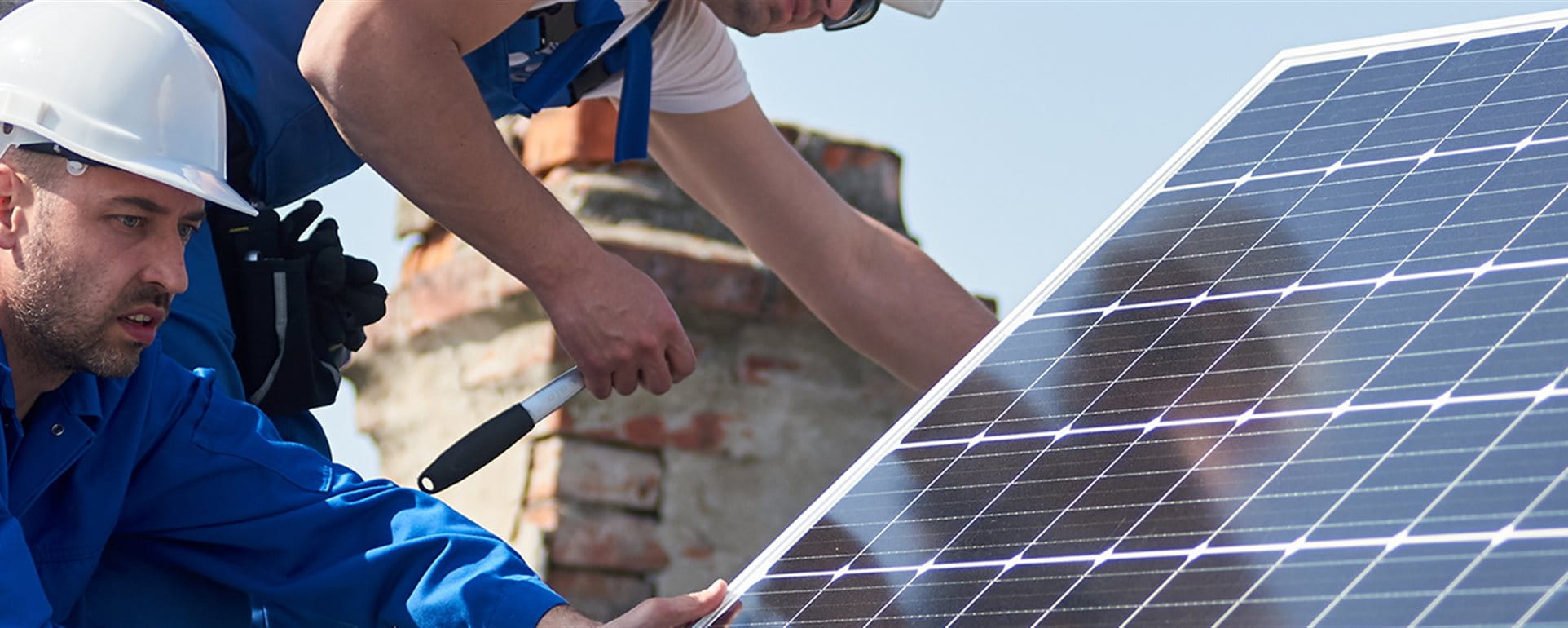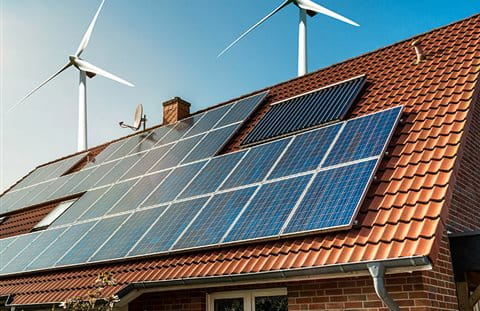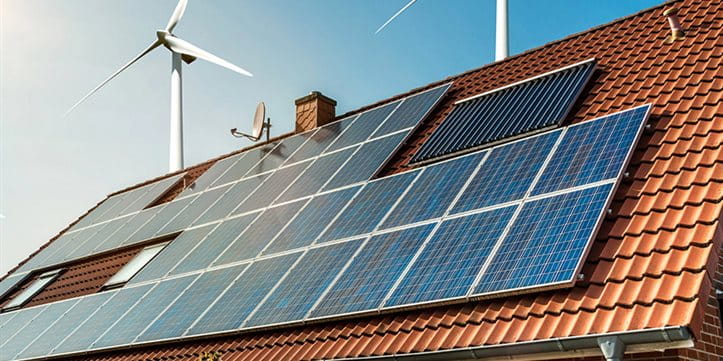- What types of solar energy systems are there?
- Is my house suitable for a solar energy system?
- How stable is the power supply with a solar energy system?
- Are there regulations for the installation of a solar energy system?
- Own use or feed-in – which is more worthwhile?
- How much do I need to invest in a solar energy system?
- Plan financing
- Insure your solar energy system correctly
- Conclusion: Is a solar installation worthwhile?
- Useful links
What types of solar energy systems are there?
There are basically two types of solar system:
- Photovoltaic systems generate electricity. They are ideal if you want to cover your own electricity requirements and reduce electricity costs.
- Solar heating systems produce hot water and support the heating system. This is particularly interesting if you want sustainable heat for your home.
Is my house suitable for a solar energy system?
Whether a purchase is worthwhile depends on various factors – especially the location. Most regions in Switzerland offer good conditions for solar installations. Nevertheless, an individual check is worthwhile. For an initial assessment, there are now online calculators, such as the solar calculator from the Swiss Solar Energy Industry Association or the calculator from the Swiss Federal Office of Energy.
In addition to the location, it is also important to determine whether your building is suitable for a solar energy system at all. Here too, online calculators are very helpful for an initial assessment. For example, you can check quickly, free of charge and without obligation whether the available roof and façade surfaces and the orientation of your building are suitable for a solar energy system.
Please note: The load-bearing capacity of the roof cannot be determined in the solar roof calculator.
Tip
An assessment by a GEAK expert (cantonal building energy certificate) can provide valuable information on the energy efficiency of your home and possible improvements. This includes checking how suitable your house is for a solar energy system.
How stable is the power supply with a solar energy system?
Electricity production from solar systems fluctuates depending on the weather and time of day. With battery storage systems, you can store surplus energy and increase your self-sufficiency and security of supply. Important to know: The economic viability of battery storage systems depends, among other things, on electricity prices and subsidies. The same applies to the possibilities of joining together in a local electricity community (LEG) or a self-consumption community (ZEV)
For ecological reasons, experts still disagree on whether and which batteries are the right type of storage system. Added to this is the fact that, if the costs are higher than the electricity and feed-in tariffs, then a battery is no longer economical. You can find more information on battery storage and self-sufficiency in the SwissEnergy guide.
Incidentally, there are subsidy programs for battery storage in many regions. You can obtain further information from your commune or from the Swiss Federal Office of Energy: Funding and subsidies for energy projects
Are there regulations for the installation of a solar energy system?
Before installing such a system, you should know the local regulations and requirements of your commune:
- Are there any building regulations?
- Do you need to have the solar energy system approved or register it? What documents do you need for this?
- What fire safety regulations are there?
- Can you apply for subsidies in your canton or commune?
- Ask your cantonal buildings insurance company whether the system must be insured against fire and damage caused by natural hazards with the canton.
Tip
Contact the building authority or the relevant authorities in good time. This ensures that your solar project runs smoothly. In addition, professional solar system installers will advise and support you on this topic.
Own use or feed-in – which is more worthwhile?
Whether a solar installation is economically viable depends primarily on your own consumption, the possibilities of local storage and/or interconnections, and the current feed-in tariffs of your grid operator. The options and figures can differ significantly depending on the region – it is therefore worth clarifying them individually. The cost-effectiveness calculator from the industry association Swissolar can help to clarify which option is most profitable for you. Important to know: The calculator is a complex professional tool and is only available free of charge to Swissolar members.
Depending on the situation, a ZEV or LEG may also be worthwhile. Further information on the various models for energy communities can be found at www.lokalerstrom.ch.
The use of a battery storage system and the corresponding energy management can also have a significant impact on economic efficiency. Here too, the solar calculator can provide initial information.
How much do I need to invest in a solar energy system?
Investing in such a system should be well planned. There are various cost factors to consider. These costs are incurred for the system:
- Acquisition costs: The cost of purchasing a photovoltaic system depends on the type of building (e.g. detached house or multi-family dwelling).
- Service and warranty: Maintenance costs for things like regular servicing or cleaning, as well as manufacturer and additional warranties, should also be taken into account. There are differences in installation, service and warranty services that affect the cost of the photovoltaic system.
Many providers of photovoltaic systems offer calculation examples or advice on their websites.
The following can reduce costs:
- State subsidies: The federal government and cantons support the installation, e.g. with one-off subsidies. However, this depends on various parameters. The best way to find out about this is to inquire directly about support programs in your area(e.g. City of Zurich). There are also online search options to find energy assistance programs in your area.
- Tax deduction: The costs can be deducted in the tax return.
After deducting subsidies and tax savings, the effective investment costs remain.
Plan financing
The entire investment amount is not always available immediately. There are however flexible financing solutions, such as those offered by investerra.ch, to ensure that the decision for sustainable energy does not fail due to a lack of start-up capital:
- Individual financing: With investerra.ch you can finance your solar energy system quickly and easily – without a high one-time payment.
- Plannable installments: The costs are conveniently spread over monthly installments. This preserves your financial flexibility.
- Integrated insurance: With Investerra, the appropriate insurance is integrated directly into the monthly installments. Your solar installation is comprehensively protected against damage – even during installation, including loss of yield during the entire operating time.
- Protection against special risks: Special risks such as death can also be covered: Should a spouse or borrower pass away, integrated insurance ensures that your family is not left with the ongoing loan installments.
- Independent and fast: You are free to choose your installer and submit your quote to investerra.ch. After a brief check, you will receive a suitable offer and can get started straight away.
- Ownership is with you: In contrast to many contracting and leasing models, the system is yours from the outset.
Also check whether your commune or canton subsidizes solar installations with state subsidies. This allows you to apply for subsidies in good time.
Insure your solar energy system correctly
A solar installation is a valuable investment that should generate long-term returns. However, like any technical system, it is exposed to various risks – such as storm, hail, fire, theft, vandalism or technical defects.
With Zurich solar installation insurance, you are comprehensively protected:
- Cover for damage caused by natural events, fire, theft and vandalism
- Damage due to internal causes, e.g. material and construction defects
- Insurance of loss of earnings and additional costs in the event of loss of business due to damage
- Temporary automatic insurance cover for extensions or upgrades to the solar power system
- In the event of a loss: Fast and uncomplicated support
- Fire damage, if not compulsorily covered by the cantonal buildings insurance (see above "Are there regulations for the installation of a solar energy system?")
This keeps your investment safe and your energy supply reliable – from day one.
Find out more about solar installation insurance from Zurich.
Advantages and disadvantages summarized
These are the most important advantages of solar installations
- Environmentally friendly: No CO₂ emissions, and they reduce greenhouse gases
- Offers independence from the electricity market and price fluctuations
- Saves electricity costs in the long term
- Low maintenance and long service life
- Sustainable thanks to renewable energy sources and low demand for fossil fuels
- Many financing options, e.g. via investerra.ch as a flexible financing solution with integrated insurance from Zurich
These disadvantages may arise
- Initial investment necessary despite subsidies and tax deductions
- Fluctuating electricity production, depending on the weather and time of day
- Sufficient roof area required
- Depending on the location, legal requirements can make planning and installation more difficult
Tips
- Pay attention to the hail resistance option when selecting the module.
- Have a location and property analysis prepared for your property with the Zurich Natural Hazards Radar.
Storms and hail are particularly relevant natural hazards for exposed solar installations. Depending on the location, your system must be designed and constructed to withstand these natural hazards, so that insurance benefits can be provided without restriction.
Conclusion: Is a solar installation worthwhile?
Solar energy systems offer numerous advantages: They are sustainable, environmentally friendly, and help to reduce electricity costs and be more independent. Today, challenges such as investment costs or fluctuating production can often be significantly cushioned by targeted subsidies, financing solutions and integrated insurance. With the right planning, solar energy becomes a profitable and secure investment for the future.
Useful links
- Local electricity
- Support programs for energy and mobility – Energiefranken
- Funding and subsidies for energy projects
- Solar calculator
- How much electricity or heat can my roof produce?
- Storing solar and thermal energy in the home
- Cost-effectiveness calculator
- Solar calculator
- Financing a solar installation – Investerra
- Insurance for renewable energies | Zurich Switzerland











